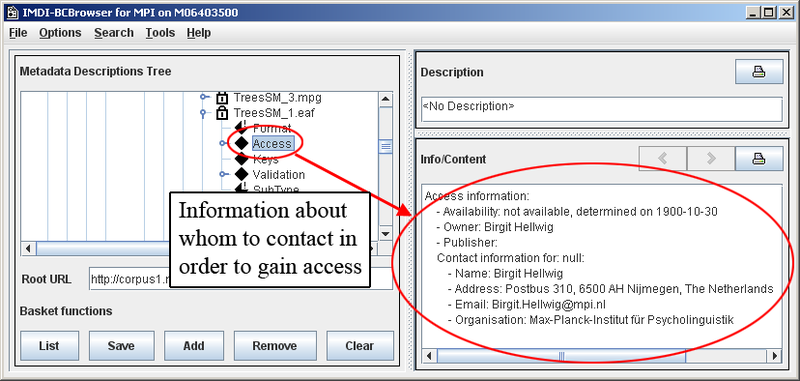The lowest level of the corpus hierarchy contains the session or resource bundle. (These two terms are used interchangeably, ‘session’ being the preferred term for spoken corpora, and ‘resource bundle’ for written corpora.) A session or resource bundle corresponds to a meaningful unit of analysis, usually to a piece of data having the same overall content, the same set of participants, and the same location and time, e.g., one elicitation session on topic X, or one folktale, or one ‘matching game’, or one conversation between several speakers.
A session or resource bundle contains different files. The following four types of files exist:
Metadata files (see Section 2.3.4.1).
These files contain information about the session, e.g., its date and location, its content and its participants. They are of the IMDI Editor format.
Media files (see Section 2.3.4.2).
These files contain the audio or video recordings. They are usually digitized in one of the following formats: MPEG (
*.mpg), Cinepak-Quicktime-Movies (*.mov), WAVE (*.wav).Annotation files (see Section 2.3.4.2).
These files contain the transcripts, codings and annotations. Their format varies (e.g., ELAN, Media Tagger, Shoebox, CHAT, etc.)
Info files (see Section 2.3.4.3).
These files contain further background information on specific topics. They are in PDF or HTML formats.
With a few exceptions, metadata and info files are publicly accessible. This policy enables researchers to search metadata and to thereby gain an overview of the available material.
Annotation and media files are handled differently in the different corpora: some corpora allow for general access (e.g., the CGN corpus), while others do not (e.g., the MPI corpora). In the latter case, if you have not been explicitly granted access by the responsible researcher(s), you will not be able to access the files. To gain access, ask the responsible researcher(s) for permission. Contact details are displayed in each corpus, e.g.:
Responsible researcher(s), by contrast, have unrestricted access to all files. This includes the following possibilities:
Access to metadata and info files, including (a) all suppressed information and (b) the possibility to update the information. See Section 2.3.4.1 and Section 2.3.4.3.
Access to media files. See Section 2.3.4.2.
Access to annotation files, including the possibility to continuously update them. See Section 2.3.4.2.
